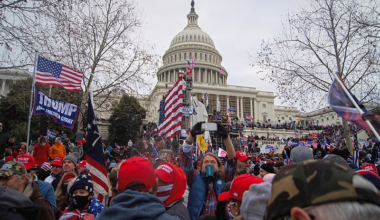
In a decent and sane world, we need not have cared who was elected President of the United States. But since 1945, if not earlier, this development has become of consequence to the rest of the world, given the power vested in the office of the president, and more importantly the power of the country itself. And so, every four years we begin where we started and wonder what it means when a new president has been elected. To those of us who pay close attention to these spasms of public spectacle and pseudo-democracy, a terrible realisation struck us upon inspection of the contenders: they were both equal glimpses of a deep moral and political bankruptcy in modern politics. No liberal appeal to choose the supposed lesser evil should placate those who prefer to do their own thinking. As Christopher Hitchens masterfully put it in a 1996 essay on Bill Clinton:
Post-Modern politics has dinned into us the concept of the ‘lesser evil’. One must, in other words, always be ready to accept Clinton (or Blair, or Mitterand) lest worse befall… How odd; that those who speak of a limitless offering of free will and free choice should be so insistent that one of the main items of decision involves no choice or alternative at all… By stressing the idea of ‘no alternative’, the non-ideological have redefined politics as a question of management…
This should have served as a ready reply for whenever liberals and centrists claimed that there was no choice but to choose Kamala Harris, lest even worse befell us. The count is clear thus far: Donald Trump has defeated Harris in both the popular vote and the electoral college, where he has (as of writing) gained 295 votes, well past the 270 needed to win. He now joins Grover Cleveland as the only other man to have won two non-consecutive terms as US President.
Much digital ink will be spilt over why Trump was successful. There are a few key points here. Firstly, the same things that made him appeal to large segments of the population in 2016—the braggadocio, the vaunted business acumen, and the politically incorrect rhetoric—were much in evidence again, undimmed by the waves of criticism he received. Talk of fascism and the authoritarianism to come seemed to be absurd hyperbole or a smear. And no doubt Trump’s defiance in the face of that famous bullet helped.
Secondly, Trump talked more starkly about immigration and pledged various measures to ensure mass deportations. Given how important an issue this is to many Americans it undoubtedly would have resonated, and not only with white voters. Finally, and as ever, there was the economy—the value of each dollar in the pocket was significantly diminished in the minds of voters. Inflation in the last few years, and the consequent increase in the cost of food, eliminates any other argument about positive macroeconomic performance. What care does the average citizen have for high GDP growth, let alone how well the stock markets are doing?
Now the result is clear, it is worth delving into what we have been left with. The primary difference between the two contenders was their domestic policies. On tax policy, guns, and healthcare the two diverged from one another. Abortion, which featured prominently in the campaign ads, was perhaps the most significant dividing line. However, the domestic battle has to be continued by the Democrats, who will invariably fight to claw back their losses.
On the foreign policy frontier, Harris and Trump were remarkably alike. The differences which existed were not worth having, while the overlaps were rather familiar and altogether lethal. American politics is simultaneously adversarial and consensus-driven, but in the wrong order and manner. When it comes to the rhetorical viciousness with which candidates are treated, and treat each other, the conduct is extraordinary to see in a democracy. No smear is beyond reproach, no red lines exist. However, when it comes to the major affairs of state, especially concerning foreign policy, there is a broad consensus spanning the Democratic and Republican parties: the commitment to the maintenance of the informal American empire, the constant manufacturing of external enemies, and the need to keep the population removed from foreign policy matters, unless they can be marshalled to support an agenda. A few areas suffice to demonstrate this point.
The Democratic and Republican establishments spent much of their campaign competing to be the most sycophantic in their support of Israel. In September, Trump cast himself in the role of protector of Israel and marked Jewish Democratic voters as ‘fools’ for thinking they would be safe with Harris as president. While speaking at the Israeli American Council, Trump also boasted: ‘I gave them the Abraham Accords, I recognised the capital of Israel, and opened the embassy in Jerusalem, gave them billions and billions of dollars, I was the best friend Israel ever had.’ Seeking to rise to the occasion, Harris said in her debate with Trump, ‘I have my entire career and life supported Israel’, while vice presidential candidate Tim Walz announced during his debate with JD Vance that ‘the expansion of Israel and its proxies is an absolute fundamental necessity for the United States.’
Think what it means for any individual, let alone one seeking the vice presidency, to declare such a thing without shame. This was an unabashed declaration of the need for Israeli supremacy in the region from the so-called ‘Left’ of American politics. Even more telling, hardly anyone took notice of it. It may have helped that Walz was fairly dour-faced when he made the statement. Compare Joe Biden, who, in a now-infamous moment in the Senate in 1986, shouted: ‘Were there not an Israel, the United States would have to invent an Israel, to protect her interests in the region.’ How right he was. The rhetoric is not, in these examples, empty. Support for Israel on both sides of American politics is unequivocal and unconditional and has been amply demonstrated during the Israeli slaughter of Palestinians over the past year. There was no daylight between the contenders on this score, and the fate of Palestinians, while resting in many ways on the actions of the United States, was in no way going to be materially changed by the election given the bipartisan consensus that some lives are more equal than others.
The consensus extends to China as well. Trump’s hostility to China was vocal during and after his campaign for the presidency. His primary contention was that China’s ascendancy reflected US decline and he was the man to fix it. Biden and then Harris did not seem to differ in their views. In their National Security Strategy of 2022, China was named as ‘the only competitor with both the intent to reshape the international order and, increasingly, the economic, diplomatic, military, and technological power to do it.’ The Biden administration maintained the roughly ‘$360 billion in tariffs on China that were implemented by Trump and introduced tens of billions of dollars in additional duties’, as the Council on Foreign Relations reports.
In addition, as the historian Adam Tooze has recently argued, there has been a concerted effort by the US under Biden to stifle China’s technological development, leading Tooze to conclude that ‘Bidenomics is Maga for thinking people.’ American statecraft for nearly two decades has seen China as a rising power, inevitably destined for conflict with the United States—and, given China’s greater resilience than old foes such as the Soviet Union, it is to be more keenly feared. In any case, there are no meaningful distinctions between Democrats and Republicans on this matter. Both view China as the enemy and unironically accuse it of being a source of global instability. Given the tainted waters that American political elites swim in, one cannot expect radical, intelligent alternatives to be pursued by any of them, whatever their party affiliation.
Finally, the most obvious and least discussed consensus in American politics is the belief that American hegemony in the world is necessary and just. This self-conception is of course not historically unique, but it is the reality of our present era and therefore merits scrutiny. This role of global ‘policeman’, as apologists would have it, is exemplified by the presence of 750 American military bases in roughly 80 countries around the world. Alongside this fact lies another: the United States’ share of global arms exports between 2019 and 2023 was 42%, higher than in the period 2014-2018, when it was 34%. Second place is claimed by France, a former empire, well known for its unilateralism and interventionism in Africa. Only when we get to third and fourth place do we arrive at America’s official enemies, Russia and China, whose share of global arms exports are 11% and 5.8%, respectively.
Why America feels the need to retain such immense military power is a subject for another day. For the purposes of this article, what matters is how the two presidential candidates treated these facts. Kamala Harris declared that she ‘will ensure America always has the strongest, most lethal fighting force in the world’ while Finland and Sweden became NATO’s 31st and 32nd members under the Biden administration. Trump, who is often characterised as an isolationist, is no less committed to American predominance but simply wants to be paid and praised more for it. He is not fundamentally committed to undoing the American hegemon consensus and shifting the resources poured into the military into domestic alternatives such as widespread infrastructure development and nationalised healthcare. Regardless of who won the presidential election, American power would always have sought to maintain itself.
The only major outstanding matter is Ukraine. Russia’s invasion in February 2022 saw its forces sweep into the country before being met with enough Ukrainian resistance to force an ongoing stalemate. The most significant action taken by the Biden administration was the decision to publish the intelligence which proved Russia was amassing troops along the border and intending to invade. This instantly killed any possible attempts to argue that no such thing had occurred, either from the Russians or any sceptics in the West. Biden’s administration has provided billions in aid and arms to the Ukrainians over the past nearly three years.
Trump’s victory, on the other hand, has caused some alarm among those who support Ukraine, given the admiration he has shown for Putin and his dithering on US commitment to Ukraine. However, we should not assume that there will be a radical sea change simply because the Democratic Party will be out of power. It was, after all, a Republican-controlled House of Representatives that approved aid to Ukraine in April 2024. Moreover, Trump’s rhetoric does not necessarily match his actions. The direction he chooses on Ukraine ultimately rests on two factors: how conditions on the ground change and which way the war turns in the next four years, plus what his closest advisers are telling him about the war, since Trump is not personally well-versed in the issue.
Conclusion
America was always an aspiration to an ideal. Realising that this promise to greatness has never been, and may never be, fulfilled is part of the tragedy of the American story. And so, while the election of Donald Trump more than anything signifies the discontent of millions of people who resent what established political elites have done to their country, it will not materially and meaningfully improve their lives. Americans, like the rest of us in liberal democracies, are given essentially two names and a chance to push a button to pick a favourite, before we retreat back into our lives and leave the work of management up to the men in suits.
It should not be forgotten, however, that the highest price of this farcical contest will ultimately be paid by non-Americans, especially those living outside of Europe, who would rather not have heard of the names of the people sitting in Washington making decisions without wisdom or decency, but who, by virtue of the big sticks they carry, cause immeasurable damage to untold numbers in pursuit of ignoble aims disguised by noble rhetoric.
Related reading
US Election 2024: On ‘Lesser Evilism’, by Ralph Leonard
Donald Trump is an existential threat to American democracy, by Jonathan Church
Donald Trump, political violence, and the future of America, by Daniel James Sharp
American democracy will soon turn 250. Freethought can reinvigorate it. By Patrick Seamus McGhee
‘Project 2025 is about accelerating the demise of a functioning democracy’: interview with US Representative Jared Huffman, by Daniel James Sharp
Image of the week, by Paul Fitzgerald
White Christian Nationalism is rising in America. Separation of church and state is the antidote. By Rachel Laser
The radical atheism of the American revolutions: interview with Matthew Stewart, by Daniel James Sharp








Your email address will not be published. Comments are subject to our Community Guidelines. Required fields are marked *
Donate